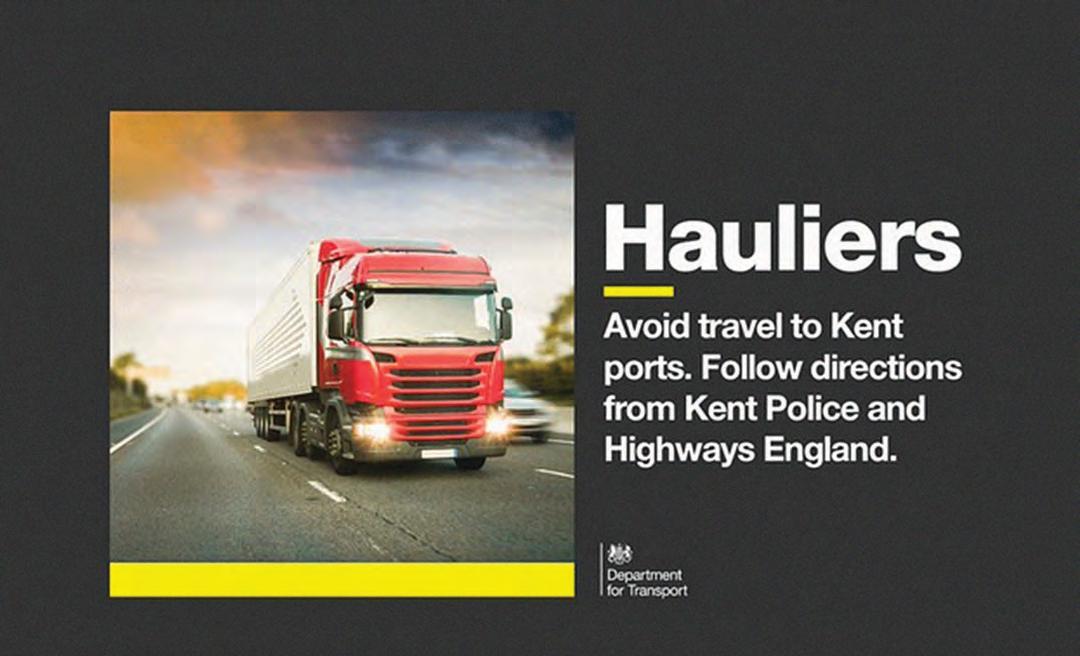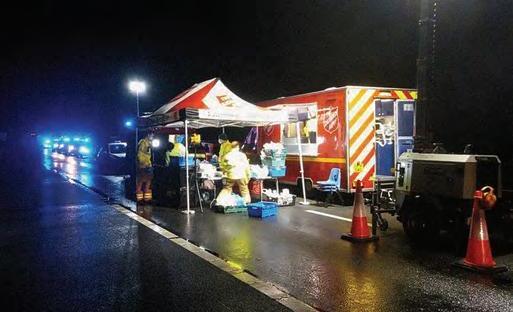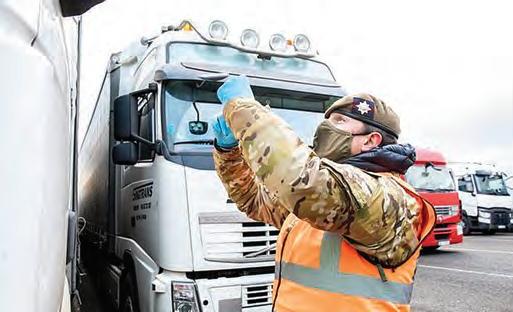
7 minute read
When the trucks stopped
The DfT used social media to alert HGV drivers to the latest developments regarding travel and parking options in Kent
Worries about a new variant of COVID-19 saw Brexit truck parking management plans put into action before Christmas
Advertisement
Emergency truck management and parking protocols developed in anticipation of potential disruption caused by the completion of Brexit were implemented in order to deal with a cessation of crossChannel movement due to the emergence of a more contagious strain of COVID-19.The travel ban between the UK and France was imposed by the French government on Sunday 20 December after the British government warned of a new, fast-spreading variant of coronavirus and had introduced stricter Tier 4 restrictions across London, southern and eastern England. The ban affected air, rail and ferry traffic, including lorry drivers. The Channel is a vital trade route for the UK, with around 10,000 lorries travelling between Dover and Calais each day, largely delivering fresh produce.
The suspension of ferry and Eurotunnel services resulted in growing tailbacks of HGVs heading to Dover on the M20. Hauliers were advised to avoid travelling to Kent as disruption could last for several days. This led the UK government to trigger Operation Stack and Operation Brock, emergency traffic management procedures designed to keep motorways and roads in Kent operating.
Operation Brock opens up more of the road network in Kent because it means traffic can continue to move in both directions on the M20. Highways England deployed a moveable concrete barrier installed on the M20 that creates a new layout with a contraflow system. This allows traffic to continue travelling in both directions on the motorway at the same time as port-bound HGVs are queued, if necessary, on the coastbound carriageway until they can travel through to the Port of Dover or Eurotunnel.
On 20 December, Prime Minister Boris Johnson addressed the cross-Channel travel ban in a 10 Downing Street press conference. Johnson said he had chaired a meeting of the government’s emergency COBR committee in order to co-ordinate a UK-wide response. Johnson tried to sound a reassuring note, saying: “It is vital first to stress that these delays – which are only occurring at Dover – only affect human-handled freight, and that is only 20% of the total arriving from or departing to the European continent, which means the vast majority of food, medicines and other supplies are coming and going as normal.”
The Prime Minister said that ongoing preparations for the end of the Brexit transition period meant plans has been made for severe delays in cross-Channel road traffic. “You may also be aware – in fact, I’d be amazed if you weren’t – that the government has been preparing for a long time for exactly this kind of event. So working with the Kent Resilience Forum, Kent County Council and Highways England, we’ve activated our long-prepared plans, with the result that we have already been able to reduce the number of lorries waiting on the M20 from 500 to 170. The site at Manston Airport is ready to cope with any overflow.”
The Kent Resilience Forum (KRF) worked with central government to manage traffic disruption in the county. The KRF partners used broadcast interviews and social media to encourage hauliers to avoid travelling to Kent’s ports while sailings were suspended.
However, many vehicles still arrived in the county. At one point, around 5,000 trucks were stranded in Kent. Many HGVs were redirected to a holding facility at Manston Airport. Lorry drivers directed to Manston were able to access food, welfare and toilet facilities. However, with many truck drivers parked up on the M20, Kent County Council provided them with snacks, drinking water and hot food. Portable toilets were also set up at 1 km intervals between junctions 10a-11. A number of charities also stepped up to provide HGV drivers with hot food at the roadside.
Discussions about how to free-up movement between the UK and Europe took place on several fronts in the run-up to Christmas. The European Commission urged other EU member states to lift travel bans affecting the UK, but said non-essential travel should be discouraged. The Netherlands and Belgium relaxed bans on arrivals from the UK, as long as they had a recent negative result.
After several days of gridlock, on 23 December a new protocol
Lorries found Dover closed

A Salvation Army roadside food station Highways England’s movable barrier



was agreed between France and the UK that determined that all lorry drivers, irrespective of nationality, would be required to take a lateral flow test that can detect the new strain of COVID-19 and provide results in around 30 minutes, rather than the 24 hours required after a PCR test, which takes around three days.
Testing sites created at Manston Airport and elsewhere were organised by NHS Test and Trace with support from the UK armed forces. Staff at Manston provided tests to hauliers to be self-administered in their cabs under supervision. The results are communicated to the driver via text message or email, identifying them via their number plate. Hauliers with negative tests were released in batches to manage traffic flows. If a test proved positive, the haulier was directed to leave the Manston site in their vehicle and provided with accommodation to enter self-isolation for 10 days.
The testing protocol between the UK and France ran until 6 January, when it was reviewed. The French government changed its requirement on 7 January, meaning that hauliers crossing the Channel must have had a negative coronavirus test within 72 hours of crossing. If they do not meet these requirements, drivers are stopped from travelling. To help hauliers get tested before travelling to Kent, the UK government has set up 34 information and advice sites across the country. The government also offered to help businesses to set up a testing centre at their own premises to ensure trucks heading for France depart ‘COVID ready’.
Transport Secretary Grant Shapps said: “After the decision by the French government back in December, we acted swiftly to find a solution to the border closures, so hauliers could continue to travel and people continued to get their deliveries. Following the French government’s decision to extend the current arrangements, I continue to urge all hauliers to get tested before getting to the border, and only travel if they test negative. To help make this possible we are offering support to businesses to set-up testing facilities at their own premises, assisting the smooth passage of trucks and good across the border, as well as setting up testing at information and advice sites around the country.”
While COVID-19 was disrupting cross-Channel traffic, the UK government and European Union managed to agree a trade deal on Christmas Eve, meaning there was no need to extend the Brexit transition period, which ended on 31 December. How the new trading arrangements impact on cross-Channel freight traffic will become clearer over the coming weeks and months.
Lorry parking thefts increase
A lorry whose load has been stolen

Truck drivers are being targeted by criminal gangs, with around £48m of goods being stolen in the UK in the first three quarters of 2020. The National Vehicle Crime Intelligence Service (NaVCIS) said that between January to September there were 3,016 lorry thefts in the UK. NaVCIS is a national police unit that tackles vehicle finance crime and associated serious and organised crime.
Mike Dawber, a field intelligence officer with NaVCIS, said thieves tend to target lorries using arterial routes, such as the A1, M62 or M1 in West Yorkshire. “The haulage industry in general is working to tight margins, so any significant losses or thefts can have a devastating effect on them,” he told the BBC. “By working closely with industry and the police, we are improving awareness of secure parking standards to increase the number of lorry parks in the UK that have enhanced security measures. Only a small amount of parking locations in the UK are deemed ‘secure’ or ‘safe’. It’s important to recognise this as more than 70% of offences take place at unsafe or unsecure locations.”
The Road Haulage Association (RHA) has called for more secure parking for HGVs. The RHA’s head of licensing and infrastructure policy, Tom Cotton, said: “Due to the shortage every night of 11,000 spaces, the problem is getting worse. In the pandemic the government very early on identified lorry drivers as key workers. Sadly that doesn’t seem to be reflected in the facilities that are provided.”
The Department for Transport (DfT) said: “We are aware of the concerns that many drivers and operators have expressed about the provision, quality and value of lorry parking in the UK.”




